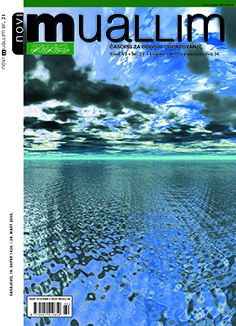INDIVIDUALIZATION AND TALENT
DOI:
https://doi.org/10.26340/muallim.v6i21.1200Abstract
The development of the talented represents a very complex issue in the pedagogical theory. This area is not sufficiently researched. The results of the research are often very different and sometimes even quite conflicting. Thus many authors still believe that no complete theory on the development of the talent exists as of yet. There are great differences between the students in terms of their abilities and their a priori knowledge. This heterogeneity between the students requires a very balanced approach, one in which the educational needs of all students are satisfied. Individualism has shown to be a very efficient approach in such circumstances. Through individualism of the teaching method, teaching content and style of teaching, one can be able to get the full potential out of every student. Individualism is particularly important while working with students with special needs, such as gifted students. Extensive research has revealed that if teaching is not adjusted to the talented individuals, the constraints are placed on their motivation and the result is often their failure. This can be very detrimental both for them and entire society. Many western-European countries and the America adopted the practice of creating the individualized plan for talented individuals (IEP) on the account of the significance of individualization in working with special needs students. These plans contain complete work program with the talented individuals. IEP must be adjustable and must satisfy both upbringing and educational aspects of the development of talented student. The teaching that does not involve individualization in working with the talented persons, results in lack of the motivation for learning and boredom on their part. This in turn causes unwanted consequences both for them and the society.
Downloads
Published
How to Cite
Issue
Section
License
Naknada:
a. Časopis ne naplaćuje naknadu za obradu članaka (APC) i naknadu za podnošenje članaka.
Autori koji objavljuju u ovom časopisu pristaju na sljedeće uvijete:
- Autori zadržavaju autorska prava i pružaju časopisu pravo prvog objavljivanja, pri čemu će rad jednu godinu po objavljivanju biti podložan licenci Creative Commons imenovanje koja omogućuje drugima da dijele rad uz uvijet navođenja autorstva i izvornog objavljivanja u ovom časopisu.
- Autori mogu izraditi zasebne, ugovorne aranžmane za ne-ekskluzivnu distribuciju rada objavljenog u časopisu (npr. postavljanje u institucionalni repozitorij ili objavljivanje u knjizi), uz navođenje da je rad izvorno objavljen u ovom časopisu.


